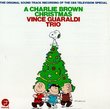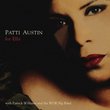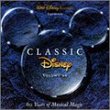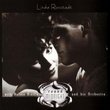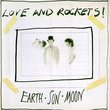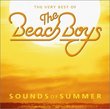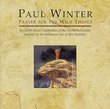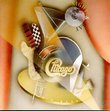| All Artists: Georges Bizet, Camille Saint-Saens, Gioachino Rossini, George Frederick Handel, Christoph Willibald Gluck, Giacomo Meyerbeer, Ambroise Thomas, Giovanni Battista Lampugnani, Gaetano Donizetti, Vincenzo Bellini, Giuseppe Verdi, Amilcare Ponchielli, Franz [Vienna] Schubert, Robert Schumann, Richard [Classical] Wagner, Joaquin Nin, American Traditional, Aaron Copland, Albert Hay Malotte, Leonard Bernstein Title: Just for the Record: The Golden Voice Members Wishing: 0 Total Copies: 0 Label: Decca Release Date: 11/11/2003 Genres: Folk, Pop, Classical Styles: Vocal Pop, Opera & Classical Vocal, Historical Periods, Baroque (c.1600-1750), Classical (c.1770-1830), Modern, 20th, & 21st Century Number of Discs: 2 SwapaCD Credits: 2 UPC: 028947612230 |
Search - Georges Bizet, Camille Saint-Saens, Gioachino Rossini :: Just for the Record: The Golden Voice
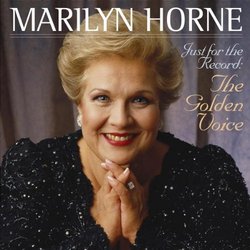 | Georges Bizet, Camille Saint-Saens, Gioachino Rossini Just for the Record: The Golden Voice Genres: Folk, Pop, Classical
No Description Available. Genre: Classical Music Media Format: Compact Disk Rating: Release Date: 11-NOV-2003 |
Larger Image |
CD DetailsSynopsis
Product Description No Description Available. Genre: Classical Music Media Format: Compact Disk Rating: Release Date: 11-NOV-2003 Similarly Requested CDs
|
CD ReviewsNot 100% satisfied with the selections, but what artistry! cherubino | Houston, Texas United States | 11/03/2004 (5 out of 5 stars) "Decca's release of this career-spanning Marilyn Horne recital contains many "golden" nuggets, but isn't the absolute best representation of her artistry, in my opinion. There was certainly plenty of material to choose from, as Horne was one of the most recorded mezzos in the twentieth century. As advertised, Madame Horne personally approved the final recital list, and the diva undoubtedly has sentimental attachment to certain selections. Furthermore, a conscious attempt was made to represent the different genres explored during her decades-spanning career. This approach, however, leaves out some truly stunning material that would have made an even stronger case on why she was such an operatic institution. In summary: The first disc begins with the Habanera from Carmen. Horne was very proud of her Carmen, noting that it surpassed sales of Callas's Tosca at one point. It deserved to be included, but I don't think she was "THE" Carmen, and besides, the whole opera is so warmed-over by now, it's hard to get anyone excited about it! From then on, we are treated to a bonanza of wonderful arie and scena. The aria from Samson et Delilah is a real gem. Horne was certainly not the most glamorous singer, but My God, the interpretation is heavenly. This is what the aria sounds like in the hands of a world-class contralto. Eccomi in Babilonia follows, and by anyone's measurement, she is the finest Arsace on record. Blessed with an extraordinary range, she is as fulminating in both the top and bottom registers. What's more, her spirited delivery magnifies the pure genius of Rossini's music. As for Cruda Sorte, "ditto," as Marilyn herself might say. Next, we are treated to two excellent Handel arias. Iris, Hence Away gives me goosebumps everytime I hear it. This was recorded in the early sixties, for inclusion in the Age of Bel Canto recital she shared with Joan Sutherland and Richard Conrad. Now, if she had recorded this a few years later, she might have drove the coloratura harder. However, at this point, the voice had a somewhat lighter quality, thus the aria isn't sung with that all-purpose "Marilyn Horne" voice we are so used to. Speaking of lightness, Dove Sei, Amato Bene will send shivers down your spine. Again, Marilyn wasn't known for her subtlety, but she proves here that she was more than capable. Just listen to the fluttering trills and fil di voce, and dare to disagree with me! One of my major complaints is it there isn't more Handel on the recital. Sure, a whole recital of Handel arias by Horne is still available, but in this best-of disc, there was room at least for Or La Tromba, the trumpet aria from Rinaldo, and a personal favorite. Also, nothing is included from Vivaldi's Orlando Il Furioso, another travesty. The pinnacle of the first disc is Addio, I Miei Sospiri, from Gluck's Orfeo ed Euridice. This is Horne magified to the nth power. Where to start? A scrumptiously sung recitativo, then the aria itself, with Marilyn pulling out all the stops. The bronzed tone, perfect breath control, spectacular coloratura fireworks, superlative diction, evenness and security from top to bottom, and Marilyn's own way of generating excitement will floor you. This is bravura singing at the highest level. After a few other selections from the French reperetoire, the disc closes with two Rossini warhorses. Again, the "ultimate" Horne best-of would have saved room for more Rossini, on the second disc. But the evidence here is ample enough to proclaim her honorific as the leading interpreter of Rossini in the last century. The second disc is less satisfactory. The first selection, Superbo Di Me Stesso sounds like it came from an inferior source, and wasn't remastered properly. Il Segreto Per Esser Felici, from Lucrezia Borgia is fine enough, but Marilyn could have ornamented more, and that snare drum is too loud! Then, we have an extended scene from Il Trovatore. Now, Marilyn herself stated that she wasn't perfect in Verdi. As she put it, she sang Verdi by not taking "both feet" out of the bel canto waters, so that she could go on singing the roles that brought her the most fame. This is understandable, but if that's the case, then we didn't need this long scene. Perhaps she wanted to highlight her collaboration with Luciano Pavarotti, and I'm sure Decca saw this as a way to lure the casual listener. For my money, though, they should have just included Stride La Vampa, and called it a day. This would have freed up lots of room for the stuff for which she's better recognized! Now, another extended scene, from Norma, is completely justified. Equally important to Marilyn's legacy as an individual artist is her legacy as one-half of the Sutherland/Horne duo. I don't need to write more- the music speaks for itself. The rest of the second disc throws in a bit of verismo (Horne is unrecognizeable in Ponchielli; Simionato she's not), a bit of German lieder, and some patriotic tunes. Along with Leontyne Price, Marilyn Horne was the most conciously patriotic singer out there, and to have left out her American recordings would have been a disgrace. But, again, we are given an ample serving of it, when it could have been scaled back some to make room for her operatic triumphs. All in all, there is enough glorious material here for any fan of the legendary Marilyn Horne, and also those who want a taste of how a superlative mezzo/contralto sounds like." Marilyn Horne scintillates Steven A. Peterson | Hershey, PA (Born in Kewanee, IL) | 05/20/2007 (5 out of 5 stars) "This 2-CD set includes 32 separate "cuts." Thus, it provides a perspective on the broad range of works that Marilyn Horne mastered. While some pockets of work may be given somewhat short shrift (e.g., Rossini), overall this shows off her skills nicely. Born in Bradford, Pennsylvania (one of the coldest places in the nation during winter), she made her operatic debut in 1954. In liner notes copyrighted in 2003, she notes that: "Can't believe it's time for a 70th birthday celebration. . . ." And neither can I, since I recall hearing her perform at the Met (via the old Texaco opera show), and it does not seem all that long ago! Some cuts well depict her artistry across a range of genres and composers. The "Habanera" from Bizet's "Carmen" is, to be sure, an old chestnut by now, but she sings it with a rich and lustrous voice. She sings a seductive aria seductively. "Eccomi al fine in Babilonia" is from Rossini's "Semiramide" and shows off her skills nicely. This piece shows off the range of her voice well. Her voice is very agile, as it would need to be to do Rossini justice. There are some nice runs; the cabaletta showcases her agility and allows her to display well sung ornamentation. From Handel's "Semele," we hear "Hence, Iris, Hence Away." This is a sprightly piece that is characteristically well sung by Horne. Handel's "Rosalinda" features a nice work for mezzos, "Dove sei amato bene?" If I hear correctly, Horne begins this with a trill in piano; there are a number of nicely executed trills in this work. This cut is smoothly and richly sung throughout. "Addio, addio o miei sospiri" comes from "Orfeo ed Oridice" by Gluck. A sprightly paced work. Horne shows off excellent ornamentation; her coloratura technique is terrific. From "Norma" (by Bellini) there are 4 cuts (from a longer scene), featuring collaboration with Joan Sutherland. The two singers worked well together in a number of operas, and this set of works illustrates that synergy beautifully. "Mi chiami, o Norma!" starts things off. The two voices meld extremely well together. "Deh! Con te, con te li prendi" features fine work all around. Both singers display good vocal dexterity. Horne hits one high note with a bit of harshness, but not an issue of any moment. "Mira, o Norma" is ravishing; Sutherland's and Horne's duet is absolutely wonderful. Finally, "Si, fino all'ore estreme." This is a fast paced duet, with both singers manifesting considerable vocal agility and sound coloratura technique. When they sing together, their voices almost sound "twinned." Finally, "Jeannie with the Light Brown Hair." Horne sings this straight, without the ghastly "opera-tizing" that some singers cannot resist. Sung simply and powerfully. Her rich voice produces a very good vocal effect. And so on. Although this CD does not fully represent her repertoire, it does provide a good sense of the art of Marilyn Horne and it suggests the range of her singing. For those wanting to get a sense of Horne's oeuvre, this is one recording that provides entrée to her body of work. " One Of The Greatest Voices of All! Lewis J. Silvers, Jr. | Palo Alto, California | 01/29/2006 (5 out of 5 stars) "I am not the only one who regards Marilyn Horne's voice as exceptional. During the seventies and eighties she was regarded by The New York Times Music Critic as possessing the greatest voice of our time. One only has to sample this "golden" collection to prove how right he was. Her "mezzo" handles Handel and Rossini like no other. Brava all the way (To say nothing about Dalila's famous aria!) And I must even mention her "Jeannie With the Light Brown Hair". This is a two CD that is a MUST for those who appreciate the glories of the human voice (To say nothing about the warmth and spirit than accompany it.)"
|

 Track Listings (12) - Disc #1
Track Listings (12) - Disc #1